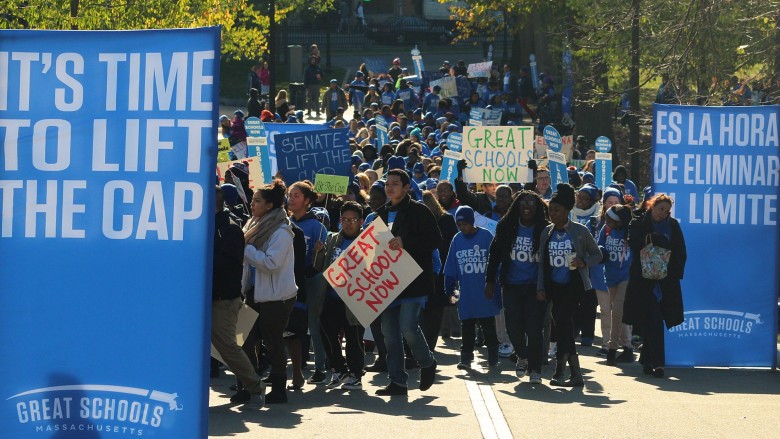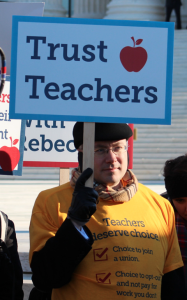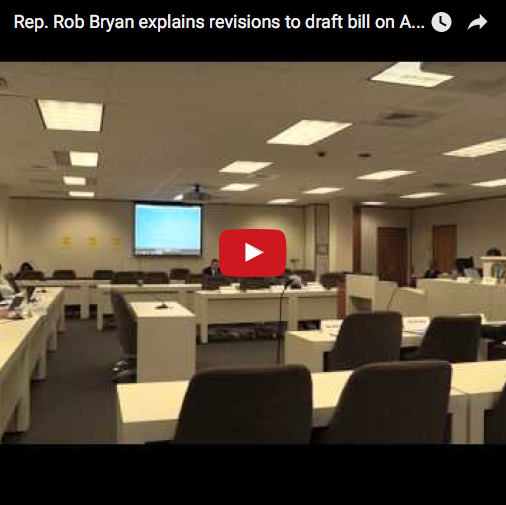
“It’s not an experiment anymore. It’s not a demonstration. It’s not a what-if. After 20 years, we have overwhelming evidence . . . of kids, parents, families who have found what they were looking for in the charter school movement here in the Commonwealth of Mass.” -Gov. Charlie Baker
It’s time to bring greater innovative education opportunities to parents and families in the Bay State.
Despite some of the best charter school networks coming from Massachusetts, the Bay State’s C-rated charter school law must be improved to allow current schools to grow and new schools to open.
Boston, and other traditionally low-performing districts, have reached the charter school cap, meaning that no new schools will be able to open in places that need choice the most until the law is amended. The Massachusetts Department of Elementary and Secondary Education estimates there more than 32,000 students on charter school wait lists.
Take Action
- 1. Add your name to stand with families who want fair access to public charter schools.
- 2. Fill out this form to volunteer in the fight to bring greater educational opportunity to Massachusetts by lifting limits on charter schools.
- 3. Were you or someone you know stuck on a wait list? Tell your story here.
Videos
Best in the Country: Stand with parents who want to choose the best public school for their children.
Say Yes To Great Schools
Parents of Massachusetts: Shellina’s Story
Great Schools Massachusetts Launch: Families from across Massachusetts take a stand for equal access to public charter schools
Latest News & Updates
Why True Progressives Should Push Massachusetts to Lift Cap on Public Charter Schools, 8.7.16
The 400 Million Dollar Lie, 8.2.16
“For Too Many Families, The Skies Have Not Cleared”: Massachusetts’ Time To Shine for Parent Power, 7.19.16
What Will Question 2 Do?, 7.15.16
Great Schools Massachusetts Launches Statewide Ballot Campaign in Support of Question 2, 7.14.16
Charter Schools Head to Ballot: More than 20,000 residents make it known they want innovation and opportunity in education via charter schools, 7.6.16
New Data Shows 98% of 2016 Boston Charter High School Graduates Have Been Accepted to College, 6.22.16
Statement on Passage by the Massachusetts State Senate of Damaging Charter School Bill, 4.8.2016
Effort to Expand Educational Opportunity in Massachusetts is National Model, 4.8.2016
Charter School Supporters Bulk As Senate Passes Education Bill 22-13, 4.7.2016
Council President Chris Anderson’s Statement on Senate Charter School Legislation, 4.7.2016
Senate Approves Phantom Charter Cap Lift, 4.7.2016
List of Senate Amendments SB 2203, 4.7.2016
Those concerned about race and equity should champion charter schools, Boston Globe Letter to the Editor, 4.6.2016
More Than 80 Latino Leaders – Joined by Governor Charlie Baker -‐ Call on State Legislature to Lift the Cap, 3.8.16
Public Information Campaign Launches To Set Record Straight About Public Charter Schools In Massachusetts, 2.12.16
A Leader’s Choice, 1.26.16
Facts & Resources
Massachusetts:
- Facts on Massachusetts Charter Schools
- For a wealth of data and information on Massachusetts charter schools, visit www.charterfactsma.org.
- Massachusetts ranks 30th in the nation when it comes to offering parent power and parent power.
- For more information on Massachusetts’ C-rated charter school law, click here.
Nationwide:
- Facts about charter schools and charter school achievement.
- Research on charter schools can be found here.















 THE REAL SEGREGATION IN EDUCATION. Education pioneer and
THE REAL SEGREGATION IN EDUCATION. Education pioneer and 